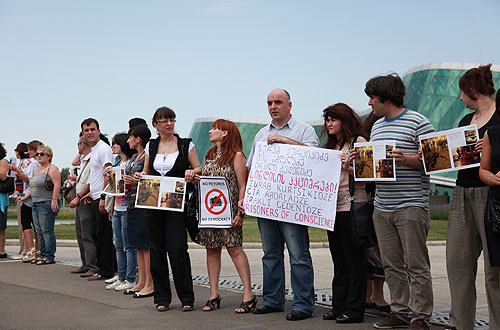
Police Say EPA Photographer ‘Long-Time Agent’

A group of Georgian journalists gathered outside the Interior Ministry’s glass facade building in Tbilisi outskirts on July 11 to ask for a meeting with Interior Minister Vano Merabishvili and to demand declassifying the arrested photographers’ case. Photo: Guram Muradov/Civil.ge
Zurab Kurtsikidze, an arrested photojournalist for the Frankfurt-based European Pressphoto Agency (EPA), is “an agent with long length of service”, who recruited two other photographers, working for the state institutions, to obtain confidential information, a senior official from the Georgian Interior Ministry said.
In an interview with the Russian daily, Kommersant, published on July 11, Shota Utiashvili, head of the Interior Ministry’s information and analytical department, said that case contained confidential information and for that reason it would remain classified as “secret.”
“Information is always scarce in such cases. No one will ever make public content of those documents. Most probably both the investigation and the court hearings will be classified as ‘secret’,” Utiashvili said.
A group of Georgian journalists gathered outside the Interior Ministry’s glass facade building in Tbilisi outskirts on July 11 to ask for a meeting with Interior Minister Vano Merabishvili and to demand declassifying the arrested photographers’ case. The case has triggered concerns among many journalists in Georgia, as well as doubts about credibility of claims against the photographers.
Irakli Gedenidze was a personal photographer of President Saakashvili and Giorgi Abdaladze is a freelancer who also was a contract photographer with the Georgian Foreign Ministry and also worked as a stringer for the Associated Press.
Utiashvili insisted that the two arrested men were “state employees” and there was no need to describe them as “photojournalists.”
He said that as state employees, they had no right to pass any material, including their photos to anyone except of press offices of their respective state institutions. He said that the two photographers were violating this rule and providing photos to Zurab Kurtsikidze and by doing so they got “hooked” by Kurtsikidze, who then made the two photographers to also provide him with confidential information.
In a videotaped statement to the police, Gedenidze says that he refused to cooperate with Kurtsikidze after the latter asked him to provide not only pool photos, but also confidential information. “But he reminded me about my signatures, which I was making on payments received for providing photos and told me that he would have used those signatures against me,” said Gedenidze. His wife, Natia Gedenidze, also a photojournalist arrested with three others, was released on bail.
Gedenidze’s pool photos, as well as photos taken by Abdaladze were widely distributed via local and international media organizations. Numerous photos with credits like “AFP Photo/Pool/Irakli Gedenidze” or “Irakli Gedenidze/Pool via Reuters” and “George Abdaladze/AP” are available on the Internet.
Abdaladze’s job with the Foreign Ministry and whether he could have had any access to any sensitive information available in the Foreign Ministry was the main issue on which Deputy Foreign Minister, Nino Kalandadze, was pressed during a regular Monday news conference.
Kalandadze said on July 11, that Abdaladze was working for the Foreign Ministry since 2009 on the contract basis and he was not the ministry’s staff member. While saying that Abdaladze was not a staff member, Kalandadze also insisted that the photojournalist was still regarded “as a full-fledged employee of the Foreign Ministry” and claimed that like any other employee of the Foreign Ministry, Abdaladze too could have had access to confidential information available in the ministry.
Kalandadze declined to comment when she was asked whether the charges of espionage against Kurtsikidze of EPA meant that Georgia was suggesting that EPA agency was in fact working for the Russian intelligence; Kalandadze said she was not in the position to comment on details of the investigation.
In a letter published by local newspapers with which Giorgi Abdaladze has been cooperating, the photojournalist insists on innocence and alleges, that his and his colleagues arrest might be a retribution personally from President Saakashvili for taking and distributing internationally photos of break up of the May 26 protest rally. He writes in the letter that Irakli Gedenidze managed to shoot "the best images", because as Saakashvili’s personal photographer he was accompanying the riot police and was given more freedom to take whatever he wanted. Gedenidze, however, then sold photos to EPA via Zurab Kurtsikidze, Abdaladze writes and adds, that although Gedenidze was not credited on those photos distributed by EPA, "but every photojournalist knew that Irakli was the author of those photos." He also alleges, that Gedenidze wife was also arrested just because to mount pressure on Gedenidze to give ‘confession statement’.
Asked how the photojournalists gained access to secret information, Shota Utiashvili of the Interior Ministry, told the Kommersant: “I want to remind you once against, that they were state employees and for that reasons they had an access to such information; but the investigation will look into how they obtain such information. Gedenidze is the President’s personal photographer; he was spending half of his working time with the President.”
“This story does not at all make us happy. There is no reason for us to disgrace and put personal photographer of the President [in jail] just for nothing. Kurtsikidze is an agent with long length of service. He recruited two others,” Utiashvili said.
In the same interview, addressing previous cases of arresting alleged spies working for Russia, Utiashvili said that the authorities were making “so much PR” out of those arrests in order to show everyone in Georgia, that “playing those games is very risky” and “if you are on hook” of foreign intelligence “it’s better to turn yourself in to police and report everything.”
This post is also available in: ქართული Русский